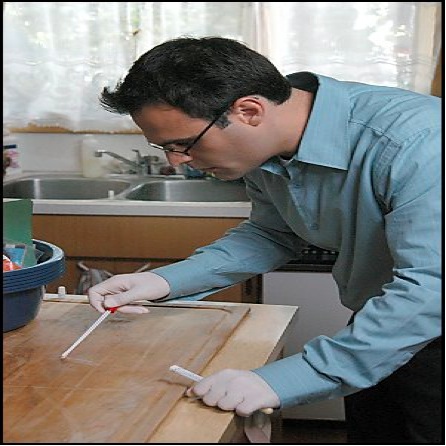During the production of Kitchen Crimes, a television series that dealt with food safety in the home as opposed to restaurants, there were a number of reoccurring themes that kept popping up. So I developed my top 10 list of Kitchen Crimes to reflect my observations from the television show.
Tops was a severe lack of handwashing or inadequate handwashing. Handwashing typically involved a quick 2 second rinse with water and drying with a dirty tea towel. Family members would pet their dogs, cats, and even in one case a pet turtle, then go and prepare food without handwashing. So, number one on my list is:
 1. Wash hands thoroughly before and after preparing food. Lather with soap and water for at least 15 seconds. Rinse well and dry with a clean towel.
1. Wash hands thoroughly before and after preparing food. Lather with soap and water for at least 15 seconds. Rinse well and dry with a clean towel.
A number of families were aware that their refrigerator should be kept at 4-5°C, but it was never checked. Families were questioned on why they should maintain this temperature and the typical answer was that it would kill bacteria. The “danger zone” (4°C- 60°C) is conducive to rapid bacterial multiplication and at 4°C, bacterial multiplication is reduced, not stopped.
2. Invest in a fridge thermometer to ensure your fridge is at the right temperature. Cold foods should be kept below 4°C. Hot foods should be at a temperature greater than 60°C.
Throughout the filming of the series, families did not use thermometers to ensure food was properly cooked. Visual inspection seemed to suffice.
3. Invest in a digital, tip-sensitive thermometer to ensure food is properly cooked.
It always bugs me when I see open packages of meat dripping bacterial laden juices on ready to eat foods, like vegetables or fruit.
4. In your refrigerator, meats should always be placed on the bottom shelves or in meat drawers in case of leakage and vegetables should be kept above to prevent cross contamination. All open or partially consumed foods should be packaged in airtight plastic storage containers.
 In one episode, I dressed up in some sort of a space suit equipped with facial gear and so on (more for effect than anything else), but it was to prove a point. Mice like to eat food so if food is left on the floor, uncovered, mice will be there.
In one episode, I dressed up in some sort of a space suit equipped with facial gear and so on (more for effect than anything else), but it was to prove a point. Mice like to eat food so if food is left on the floor, uncovered, mice will be there.
5. All dry goods need to be stored off the floor and sealed properly to prevent entry of rodents or insects.
To ensure food is adequately cooled in the fridge,
6. Do not over-pack the refrigerator or freezer. This restricts proper air flow and prevents the appliances from functioning efficiently.
This next one always gives me a headache, happens very frequently in restaurants. Vegetables and fruit typically do not undergo a subsequent cooking process which leads me to number
7 on my list: Prevent cross-contamination when preparing food by designating one cutting board for raw meats and another for vegetables or any ready-to-eat foods.
8. When cleaning surfaces, wash first with soap and water then sanitize with a mild solution of chlorine bleach and water.
If one is looking for the highest bacterial counts in the household, look no further.
9. Replace dishcloths and sponges on a daily basis.
10. After dishwashing, all utensils and dishware should be air dried to prevent cross-contamination from towels.
